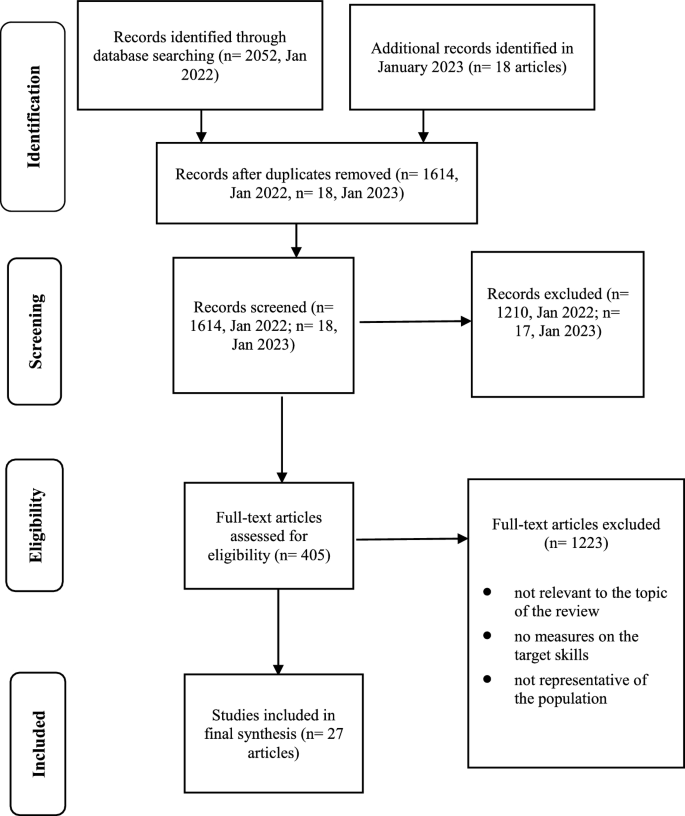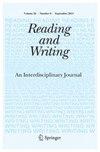Key language, cognitive and higher-order skills for L2 reading comprehension of expository texts in English as foreign language students: a systematic review
IF 2.2
2区 教育学
Q2 EDUCATION & EDUCATIONAL RESEARCH
引用次数: 0
Abstract
Abstract This systematic review addressed the following question: Which are the relations between L1 and/or L2 foundational and upper-level language skills, cognitive skills, high-order cognitive and self-regulation factors and L2-English reading comprehension skills in 11-to-19 year EFL secondary school students with different L1 language profiles? Following preferred reporting items for systematic reviews and meta-analyses guidelines, twenty-seven studies were included for a systematic synthesis of results in the light of the different grades of “family language distance” between L1 and L2-English (i.e., “close related” vs. “partially related” vs. “not related”). We found that several L1 and L2 language skills (e.g., vocabulary, morphological awareness), cognitive skills (e.g., working memory) and high-order factors as metacognitive knowledge were positively associated with L2-English reading comprehension, regardless of different language groups. Conversely, we found that several well-known predictors of text comprehension are neglected in the scientific literature on reading in L2. We discuss practical implications and key recommendations to support school and future research.

外语学生对英语说明文阅读理解的关键语言、认知和高阶技能:系统回顾
摘要本系统综述探讨了以下问题:在11- 19岁不同L1语言背景的EFL中学生中,L1和/或L2基础和高级语言技能、认知技能、高阶认知和自我调节因素与L2-英语阅读理解技能之间的关系是什么?根据系统评价和荟萃分析指南的首选报告项目,根据L1和l2英语之间“家庭语言距离”的不同等级(即“密切相关”、“部分相关”、“不相关”),纳入了27项研究,对结果进行系统综合。我们发现,无论在不同的语言群体中,一些L1和L2语言技能(如词汇、词形意识)、认知技能(如工作记忆)和元认知知识等高阶因素与L2-英语阅读理解呈正相关。相反,我们发现在有关二语阅读的科学文献中,几个众所周知的语篇理解预测因素却被忽视了。我们讨论了实际意义和关键建议,以支持学校和未来的研究。
本文章由计算机程序翻译,如有差异,请以英文原文为准。
求助全文
约1分钟内获得全文
求助全文
来源期刊

Reading and Writing
Multiple-
CiteScore
5.20
自引率
16.00%
发文量
0
期刊介绍:
Reading and writing skills are fundamental to literacy. Consequently, the processes involved in reading and writing and the failure to acquire these skills, as well as the loss of once well-developed reading and writing abilities have been the targets of intense research activity involving professionals from a variety of disciplines, such as neuropsychology, cognitive psychology, psycholinguistics and education. The findings that have emanated from this research are most often written up in a lingua that is specific to the particular discipline involved, and are published in specialized journals. This generally leaves the expert in one area almost totally unaware of what may be taking place in any area other than their own. Reading and Writing cuts through this fog of jargon, breaking down the artificial boundaries between disciplines. The journal focuses on the interaction among various fields, such as linguistics, information processing, neuropsychology, cognitive psychology, speech and hearing science and education. Reading and Writing publishes high-quality, scientific articles pertaining to the processes, acquisition, and loss of reading and writing skills. The journal fully represents the necessarily interdisciplinary nature of research in the field, focusing on the interaction among various disciplines, such as linguistics, information processing, neuropsychology, cognitive psychology, speech and hearing science and education. Coverage in Reading and Writing includes models of reading, writing and spelling at all age levels; orthography and its relation to reading and writing; computer literacy; cross-cultural studies; and developmental and acquired disorders of reading and writing. It publishes research articles, critical reviews, theoretical papers, and case studies. Reading and Writing is one of the most highly cited journals in Education, Educational Research, and Educational Psychology.
 求助内容:
求助内容: 应助结果提醒方式:
应助结果提醒方式:


